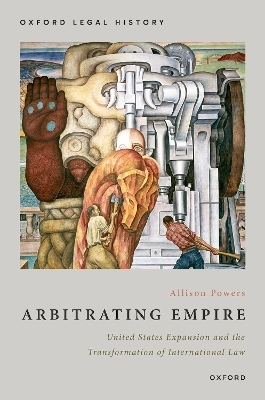
Arbitrating Empire
United States Expansion and the Transformation of International Law
Seiten
2024
Oxford University Press Inc (Verlag)
978-0-19-009300-6 (ISBN)
Oxford University Press Inc (Verlag)
978-0-19-009300-6 (ISBN)
- Lieferbar (Termin unbekannt)
- Versandkostenfrei innerhalb Deutschlands
- Auch auf Rechnung
- Verfügbarkeit in der Filiale vor Ort prüfen
- Artikel merken
Arbitrating Empire uncovers how ordinary people used arbitral claims commissions to challenge state violence across the United States Empire during the first decades of the twentieth century and why the State Department attempts to erase their efforts remade modern international law.
Arbitrating Empire offers a new history of the emergence of the United States as a global power-one shaped as much by attempts to insulate the US government from international legal scrutiny as it was by efforts to project influence across the globe. Drawing on extensive archival research in the United States, Mexico, Panama, and the United Kingdom, the book traces how thousands of dispossessed residents of US-annexed territories petitioned international Claims Commissions between the 1870s and the 1930s to charge the United States with violating international legal protections for life and property.
Through attention to the consequences of their unexpected claims, Allison Powers demonstrates how colonized subjects, refugees from slavery, and migrant workers transformed a series of tribunals designed to establish the legality of US imperial interventions into sites through which to challenge the legitimacy of US colonial governance. One of the first social histories of international law, the book argues that contests over meanings of sovereignty and state responsibility that would reshape the mid-twentieth-century international order were waged not only at diplomatic conferences, but also in Arizona copper mines, Texas cotton fields, Samoan port cities, Cuban sugar plantations, and the locks and stops of the Panama Canal.
Arbitrating Empire uncovers how ordinary people used international law to hold the United States accountable for state-sanctioned violence during the decades when the nation was first becoming a global empire-and demonstrates why State Department attempts to erase their claims transformed international law in ways that continue to shield the US government from liability to this day.
Arbitrating Empire offers a new history of the emergence of the United States as a global power-one shaped as much by attempts to insulate the US government from international legal scrutiny as it was by efforts to project influence across the globe. Drawing on extensive archival research in the United States, Mexico, Panama, and the United Kingdom, the book traces how thousands of dispossessed residents of US-annexed territories petitioned international Claims Commissions between the 1870s and the 1930s to charge the United States with violating international legal protections for life and property.
Through attention to the consequences of their unexpected claims, Allison Powers demonstrates how colonized subjects, refugees from slavery, and migrant workers transformed a series of tribunals designed to establish the legality of US imperial interventions into sites through which to challenge the legitimacy of US colonial governance. One of the first social histories of international law, the book argues that contests over meanings of sovereignty and state responsibility that would reshape the mid-twentieth-century international order were waged not only at diplomatic conferences, but also in Arizona copper mines, Texas cotton fields, Samoan port cities, Cuban sugar plantations, and the locks and stops of the Panama Canal.
Arbitrating Empire uncovers how ordinary people used international law to hold the United States accountable for state-sanctioned violence during the decades when the nation was first becoming a global empire-and demonstrates why State Department attempts to erase their claims transformed international law in ways that continue to shield the US government from liability to this day.
Allison Powers is Assistant Professor of History at the University of Wisconsin-Madison.
Introduction: The Subjects of International Law
Part I: Dispossessions
Chapter 1: Arbitrating Debt
Chapter 2: Arbitrating War
Chapter 3: Arbitrating Citizenship
Part II: Exposures
Chapter 4: The World's Easement
Chapter 5: Dangerous Precedents
Part III: Foreclosures
Chapter 6: Sovereign Inequalities
Chapter 7: The Specter of Compensation
Conclusion: Life and Property
| Erscheinungsdatum | 17.12.2024 |
|---|---|
| Reihe/Serie | Oxford Legal History |
| Verlagsort | New York |
| Sprache | englisch |
| Maße | 156 x 235 mm |
| Gewicht | 3 g |
| Themenwelt | Geisteswissenschaften ► Geschichte ► Regional- / Ländergeschichte |
| Geschichte ► Teilgebiete der Geschichte ► Militärgeschichte | |
| Recht / Steuern ► EU / Internationales Recht | |
| Recht / Steuern ► Rechtsgeschichte | |
| ISBN-10 | 0-19-009300-5 / 0190093005 |
| ISBN-13 | 978-0-19-009300-6 / 9780190093006 |
| Zustand | Neuware |
| Informationen gemäß Produktsicherheitsverordnung (GPSR) | |
| Haben Sie eine Frage zum Produkt? |
Mehr entdecken
aus dem Bereich
aus dem Bereich
neueste Manipulationstechniken als Waffengattung der NATO
Buch | Softcover (2023)
Westend (Verlag)
24,00 €
Deutschlands Schwäche in der Zeitenwende
Buch | Softcover (2023)
C.H.Beck (Verlag)
18,00 €


